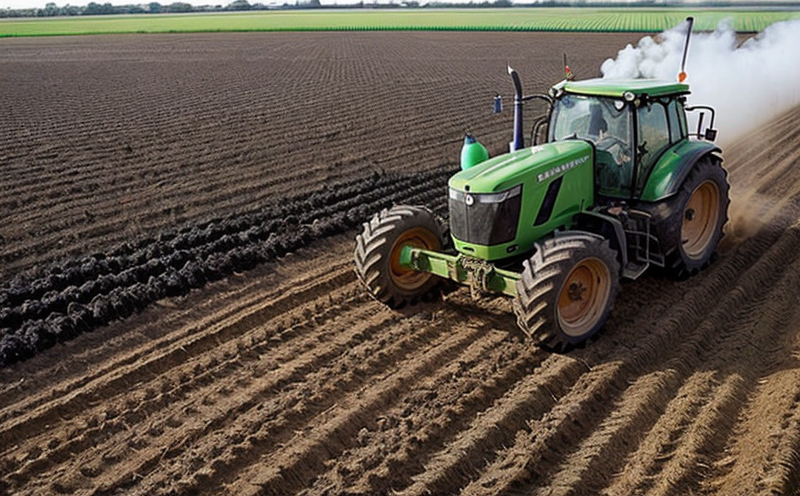
-
Chemical Safety and Certification-
Chemical Safety in Agriculture-
Managing Toxic Chemicals in Farming Operations
We provide comprehensive solutions designed to help our clients mitigate risks, enhance performance, and excel in key areas such as quality, health & safety, environmental sustainability, and social responsibility.
Discover
For many years, our organization has been operating successfully, boasting modern laboratories that meet international standards. These laboratories are equipped with the latest technology devices and equipment, and we have built a strong team of experienced and trained personnel to operate them.
DiscoverWelcome to Eurolab, your partner in pioneering solutions that encompass every facet of life. We are committed to delivering comprehensive Assurance, Testing, Inspection, and Certification services, empowering our global clientele with the ultimate confidence in their products and processes.
Discover
-
Chemical Safety and Certification-
Chemical Safety in Agriculture-
Managing Toxic Chemicals in Farming OperationsFarming operations often require the use of various chemicals to protect crops, improve yields, and control pests and diseases. While these chemicals are crucial to modern agriculture, they can pose significant health and environmental risks if not properly managed. Toxic chemicals in farming, such as pesticides, herbicides, and fertilizers, can endanger farm workers, local communities, wildlife, and ecosystems. Effective management of these chemicals is essential to ensure the safety of both people and the environment.
In this article, we will explore the importance of managing toxic chemicals in farming operations, key strategies to minimize risks, and best practices to ensure safe chemical use and disposal in agriculture.
1. Health Risks to Workers
2. Environmental Impact
3. Public Safety
4. Legal Compliance
1. Risk Assessment and Chemical Inventory
2. Proper Storage and Labeling
3. Protective Equipment for Workers
4. Safe Application Methods
5. Minimizing Chemical Use
6. Spill Prevention and Response
7. Waste Disposal and Recycling
1. What should I do if I accidentally spill a toxic chemical?
2. How can I reduce the need for toxic chemicals on my farm?
3. What are the environmental risks associated with chemical runoff?
4. How can I ensure the safety of farm workers when handling toxic chemicals?
5. Are there regulations I need to follow when using toxic chemicals on my farm?
Managing toxic chemicals in farming operations is essential for safeguarding the health of workers, the environment, and the surrounding community. By implementing proper chemical management practices, including risk assessments, safe application methods, effective PPE usage, and adherence to regulatory guidelines, farmers can reduce the risks associated with chemical use. Additionally, sustainable farming practices, such as Integrated Pest Management and organic alternatives, offer viable solutions to minimize chemical reliance, promoting long-term environmental and health benefits.

Energy and Sustainability Standards
In today’s rapidly evolving world, businesses face increasing pressure to meet global energy a...

Electromechanical Safety Certification
Electromechanical Safety Certification: Ensuring Compliance and Protecting Lives In todays intercon...

Agricultural Equipment Certification
Agricultural equipment certification is a process that ensures agricultural machinery meets specific...

Renewable Energy Testing and Standards
Renewable Energy Testing and Standards: Ensuring a Sustainable Future The world is rapidly transiti...

Pharmaceutical Compliance
Pharmaceutical compliance refers to the adherence of pharmaceutical companies and organizations to l...

Military Equipment Standards
Military Equipment Standards: Ensuring Effectiveness and Safety The use of military equipment is a ...

Fire Safety and Prevention Standards
Fire Safety and Prevention Standards: Protecting Lives and Property Fire safety and prevention stan...

Product and Retail Standards
Product and Retail Standards: Ensuring Quality and Safety for Consumers In todays competitive marke...

Automotive Compliance and Certification
Automotive Compliance and Certification: Ensuring Safety and Efficiency The automotive industry is ...

Aviation and Aerospace Testing
Aviation and Aerospace Testing: Ensuring Safety and Efficiency The aviation and aerospace industr...

Chemical Safety and Certification
Chemical safety and certification are critical in ensuring the safe management of products and proce...

Lighting and Optical Device Testing
Lighting and Optical Device Testing: Ensuring Performance and Safety Lighting and optical devices a...

Battery Testing and Safety
Battery Testing and Safety: A Comprehensive Guide As technology continues to advance, battery-power...

Railway Industry Compliance
Railway Industry Compliance: Ensuring Safety and Efficiency The railway industry is a critical comp...

Transportation and Logistics Certification
Transportation and Logistics Certification: A Comprehensive Guide The transportation and logistics ...

Healthcare and Medical Devices
The Evolution of Healthcare and Medical Devices: Trends, Innovations, and Challenges The healthcare...

Environmental Simulation Testing
Environmental Simulation Testing: A Comprehensive Guide In todays world, where technology is rapidl...

Food Safety and Testing
Food Safety and Testing: Ensuring the Quality of Our Food As consumers, we expect our food to be sa...

NEBS and Telecommunication Standards
Network Equipment Building System (NEBS) and Telecommunication Standards The Network Equipment Bu...

Environmental Impact Assessment
Environmental Impact Assessment: A Comprehensive Guide Environmental Impact Assessment (EIA) is a c...

IT and Data Center Certification
IT and Data Center Certification: Understanding the Importance and Benefits The field of Informatio...

Construction and Engineering Compliance
Construction and Engineering Compliance: Ensuring Safety, Quality, and Regulatory Adherence In the ...

Industrial Equipment Certification
Industrial equipment certification is a critical process that ensures industrial equipment meets spe...

Trade and Government Regulations
Trade and government regulations play a vital role in shaping the global economy. These regulations ...

Electrical and Electromagnetic Testing
Electrical and Electromagnetic Testing: A Comprehensive Guide Introduction Electrical and electrom...

MDR Testing and Compliance
MDR Testing and Compliance: A Comprehensive Guide The Medical Device Regulation (MDR) is a comprehe...

Consumer Product Safety
Consumer Product Safety: Protecting Consumers from Harmful Products As a consumer, you have the rig...

Hospitality and Tourism Certification
Hospitality and Tourism Certification: Unlocking Opportunities in the Industry The hospitality and ...

Cosmetic Product Testing
The Complex World of Cosmetic Product Testing The cosmetics industry is a multi-billion-dollar ma...

Pressure Vessels and Installations Testing
Pressure Vessels and Installations Testing Pressure vessels are a critical component of various ind...